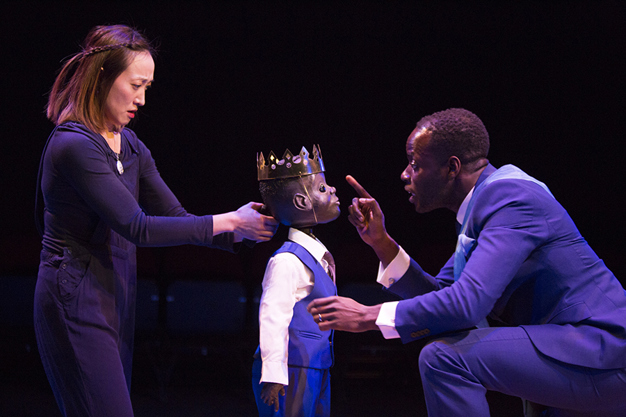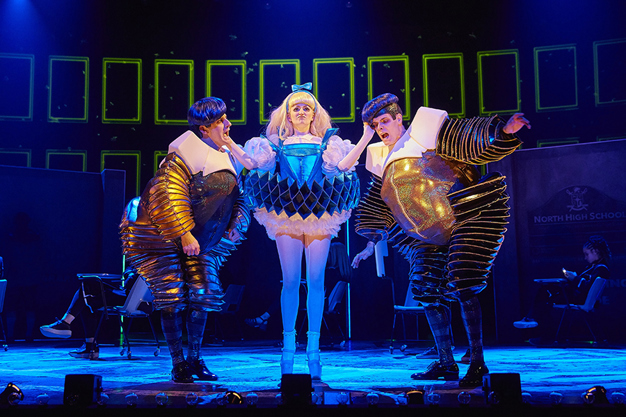
Introducing children to theatre and drama can be difficult if there is no theatre nearby – or if financial constraints mean that families are unable to afford it. So, what can teachers do to bring the magic of the theatre to life?
The National Theatre launched a collection of its finest and most popular shows specifically curated for use in state-funded primary schools. It follows the success of a similar scheme for secondary schools.
Primary schools can sign up for the scheme and use a single log-in to access a wide range of plays and productions, with accompanying lesson ideas and materials to support creative learning across the curriculum – not just in arts-based subjects.
The National Theatre Collection is currently home to more than 60 filmed theatre productions from the National Theatre and other leading venues. It is free for UK state schools and colleges.
And specifically for primary schools, a new bespoke offering features age-appropriate productions (early years to key stage 2).
“We really wanted to bring theatre into the classroom because, for a lot of children, it is difficult to go and watch live shows,” explained Jane Ball, the National Theatre’s education manager.
“The collection can never be a replacement for the real thing, but it can bring that cultural capital into the classroom that children might otherwise miss out on and be used as a resource around which teachers can build their lessons.”
Getting creative with your lessons
The collection launched with a selection of the National Theatre’s own big, spectacular productions, including Treasure Island and Peter Pan as well as abridged children’s versions of Shakespeare classics such as Romeo and Juliet, A Winter’s Tale, and Hamlet.
Since then, the National Theatre Collection has expanded to include productions staged by the Unicorn Theatre, including a selection of Grimm’s fairy tales and Greek myths, which can be used with pupils from years 1 to 6.
“We provide learning resources and lesson plans alongside the productions so that teachers can integrate them into their teaching,” Ms Ball said.
“Some began using the productions as an end-of-term treat, but increasingly teachers are getting savvier and more creative about how they use these resources.
“Each production has a synopsis and time code so teachers can pick out particular scenes, flag moments of importance, or where some of the themes might be more challenging.”
The teacher’s pack for each production offers advice and information on how to use the resources. It gives a full cast list, details of the drama, the age appropriateness and informs the teacher on which aspects might have been cut or omitted from the original story to make it suitable for a young audience.
The pack includes lesson plans and ideas, lists what resources might be needed or useful to have to hand, in which subjects it might be used, and what the learning outcomes might be.
Some schools are already using the resources in innovative and creative ways.
One primary school, for example, used the Treasure Island resources as the backdrop for a project chronicling the history of piracy; another school used the same story to engage pupils in a discussion about natural habitats and environments.
Greek myths are being used to enhance teaching about ancient Greece, while Peter Pan has inspired some schools to make puppets out of recycled materials and junk to bring alive discussions about the importance of recycling waste.
A straightforward process
Currently more than 1,600 primary schools and counting are using the National Theatre’s resources.
“There is a certain safety in using these materials and not just because they are free,” Ms Ball continued. “Asking families to find money for theatre trips can be challenging and a gamble if their children don’t enjoy it. But here you just press play, and the production comes to life!”
The recordings of the plays are hosted on Bloomsbury Publishing’s Drama Online platform. It is a straightforward process. Schools get their log-in details after signing up and any member of staff can access the resources and even pupils can use the resources at home.
“There is literally something for everyone and it brings culture into school,” Ms Ball added.
To extend and enhance its primary collection, the National Theatre is currently conducting a research project in conjunction with the Centre for Literacy in Primary Education to pilot some of its resources in six schools, focusing specifically on literacy and oracy skills.
The project involves pupils in years 2 and 4 who will be working on the stories of Anansi the Spider, Peter Pan, and I Want My Hat Back. The progress of the children will be tracked to determine how creative learning and theatre can make a difference to their literacy.


Wide-ranging: Other resources featured in the National Theatre Collection include those based on the production of The Winter's Tale in 2018 (top) and 2015’s wonder.land. Images: Ellie Kurttz/National Theatre (top) and Brinkhoff-Mogenburg/National Theatre)
Breaking down barriers
The Gateway Learning Community (GLC), based in Thurrock, comprises one secondary and four primary schools. Teachers there have enjoyed a collaborative working relationship with the National Theatre for the past three years.
This includes a programme called Let’s Perform (part of the National Theatre’s Let’s Play programme), in which staff are given CPD on how to use scripts and bring drama and theatre into the classroom.
And now, teachers across the schools have access to the National Theatre Collection and have been given the freedom to decide how they use the resources to complement their existing work.
Sian Marsh, who leads on cultural learning across the GLC, explained: “The resources are fantastic and easy to access. Teachers can dip in and out of them – we can follow a whole unit or use parts of them or take specific activities to adopt within our own schemes of work as well.”
The resources have been easily adapted into lesson planning and curriculum delivery. Gill McLoughlin, assistant headteacher at GLC’s Herringham Primary Academy, recently consulted the National Theatre Collection ahead of a lesson on Warhorse and was able to find activities to add to her existing scheme of work.
Around 55% of children attending the GLC’s schools are from disadvantaged backgrounds and Ms McLoughlin said that their work with the National Theatre was having a particular impact for these children.
She explained: “It really broke down barriers for those children who would not normally think that the theatre – or Shakespeare – is something in which they can participate. It made it fully accessible to everyone, even our special needs pupils.”
Ms McLoughlin herself attended Let’s Perform training on Hamlet and subsequently worked with the GLC English leads on how to use it to support a unit of writing. The unit included a workshop for the pupils who were introduced to the characters in Hamlet, learned about the historical context, and gained an understanding of Shakespeare’s language. They also discussed Shakespeare’s influence today.
Ms McLoughlin added: “The children took the part of Laertes in their writing and wrote letters to Hamlet to explain how upset they were with his behaviour, questioned his levels of madness, and were able to justify why the two friends should face a duel. It was absolutely amazing. It had the greatest impact on writing and truly inspired the children.”
As part of the project, the GLC hosted a performance of Hamlet by the National Theatre to which all local primary schools in Thurrock were invited.
Ms Marsh continued: “The importance of this work cannot be overestimated. We have to make sure we give pupils these opportunities.
“The National Theatre resources are high-quality and well written. They really understand the curriculum; they understand how we are meeting national curriculum expectations. All of the National Theatre’s work is of such a high quality. I would really recommend it to any other teachers.”
Further information & resources
- To access the National Theatre Collection, visit www.nationaltheatre.org.uk/learn-explore/schools/national-theatre-collection
- To find out more about the National Theatre’s wider schools and education work and resources, including the Let’s Play programme, visit www.nationaltheatre.org.uk/learn-explore/schools
Sponsored content
This article has been published by Headteacher Update with sponsorship from the National Theatre. It has been written and produced to a brief agreed in advance with the National Theatre.
